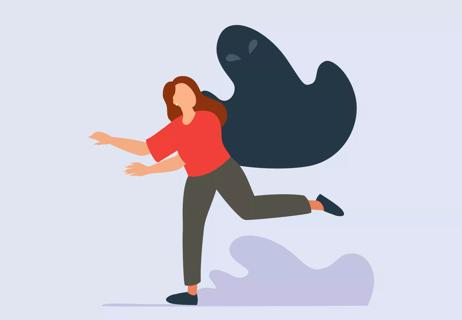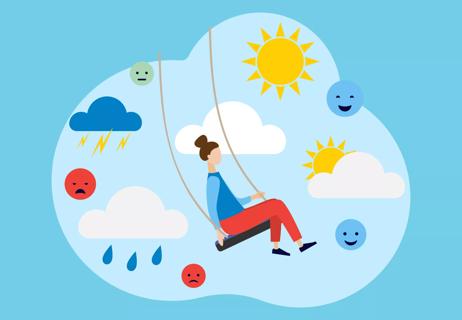There’s a difference between true symptoms and obsessing over developing an illness

The digital age has made it easy to overanalyze every ache and pain. Self-diagnosis is only a few Google searches and mouse clicks away. One minute, your shoulder hurts, and after a few searches, you’re now convinced you need invasive surgery to remove a rare tumor.
Advertisement
Cleveland Clinic is a non-profit academic medical center. Advertising on our site helps support our mission. We do not endorse non-Cleveland Clinic products or services. Policy
Could you have health anxiety, or hypochondriasis? Those disorders are now known as somatic symptom disorder and illness anxiety disorder. While both disorders include excessively worrying about your health and having an illness, in somatic symptom disorder, physical symptoms are present.
“It’s important to note that it’s not either or,” says registered psychotherapist Natacha Duke, RP. “Someone can have a medical condition and have somatic symptom disorder. The determining factor is that their worry is excessive.”
These health anxiety disorders can occur at all stages of life, but usually begin by 30. They affect approximately 5% to 7% of adults. Like other anxiety disorders, somatic symptom disorder and illness anxiety disorder have a higher prevalence in women.
Duke explains what health anxiety is and how it can be treated.
If you feel anxiety when it comes to your health, you may have illness anxiety disorder or somatic symptom disorder.
“In both these disorders, someone is excessively preoccupied and worried about their health — far beyond what is reassured by medical experts,” explains Duke. “Someone with somatic symptom disorder would be experiencing physical symptoms, which may or may not be due to a medical condition. While those with illness anxiety disorder would be worried about their health in the absence of physical symptoms, even after repeated reassurance.”
Advertisement
Like other anxiety disorders, individuals with somatic symptom disorder or illness anxiety disorder usually have some awareness that they’re worrying excessively.
“There’s usually a part of the individual that knows their worrying is out of proportion and another part that can’t tolerate any uncertainty when it comes to their health,” notes Duke.
An individual must be experiencing significant physical symptoms and debilitating worry for at least six months before a somatic symptom disorder diagnosis can be made.
With illness anxiety disorder, it’s also a six-month timeline. But the individual has a preoccupation with having or developing an illness, although there aren’t any physical symptoms present or only mild ones.
Individuals with illness anxiety disorder are hypervigilant about any changes in their bodies. This may lead them to seek repeated reassurance from medical professionals, or in some cases, avoid care out of fear.
To someone with illness anxiety disorder, worrying about a headache can spiral into fear that they have a brain tumor.
“What you often see happening with illness anxiety disorder is that the anxiety will jump around,” explains Duke. “They may be worried about a brain tumor and then they develop a cough and suddenly they’re worried about lung cancer.”
Like other anxiety disorders, health anxiety comes in varying degrees.
“We all have different personalities and some of us are always going to be more anxious than others,” says Duke. “But anxiety becomes a problem when it interferes in someone’s functioning.”
While it’s smart and proactive to seek medical advice if you’re concerned about your health, those with health anxiety often worry and think they’re sick even after reassurance from their doctor and negative test results.
Somatic symptom disorder and illness anxiety disorder are different from malingering and factitious disorder because the person truly believes that they’re sick. When a person is malingering, they are making up their illness for personal gain. In factitious disorder (formerly known as Munchhausen syndrome), a person is faking an illness, but they're doing real harm to themselves or — in the case of factitious disorder imposed on another (FDIA) — someone else.
If you have illness anxiety disorder, you may experience the following:
Advertisement
If you have somatic symptom disorder, you may experience the following:
Those with illness anxiety disorder have an unrealistic fear of a medical condition. They may view normal body functions as a sign of something more serious.
But those with somatic symptom disorder worry about their health just like someone with illness anxiety disorder, but they experience true physical symptoms.
Common symptoms include:
Sometimes, there’s no medical explanation for their symptoms. And if there’s a cause for their symptoms, they struggle to keep their worries in check.
“In the past, health anxiety disorders were often reserved for those who didn’t have a medical condition,” says Duke. “But now being told you have health anxiety no longer discounts the possibility that you may also have a medical condition.”
What causes someone to develop health anxiety? Here are a few factors.
For the last few years, we’ve been living with COVID-19. From daily news reports to mask mandates, it’s easy to understand why someone might be worried.
Advertisement
A study explains that those with COVID-19 have a high risk of developing somatic symptom disorder. There’s a lack of understanding about the long-term effects of COVID-19, and research about the disease is ongoing.
“Pandemics will inevitably have an impact on the mental health of the general population, including higher incidence of anxiety, depression and somatic symptoms,” says Duke.
During the first year of COVID-19, the global occurrence of anxiety and depression increased by 25%, according to the World Health Organization (WHO). This was due to the social isolation, fear of getting sick, loss of loved ones, changes to routine and much uncertainty that comes with a pandemic.
“In many ways, COVID-19 is the perfect storm for developing a health anxiety disorder,” states Duke. “I have seen many patients present with increased health anxiety over the course of the pandemic.”
Do you scour the internet to find information about an illness you think you have?
“The internet doesn’t usually cause health anxiety, but it certainly does exacerbate it,” says Duke.
Many health-anxious people are turning to the internet to reduce their anxieties, but instead, they’re making it much worse.
“They’re looking for reassurance, but instead they’re reading about vague symptoms that could have dozens of possible causes,” says Duke. “And if you’re health anxious, you’re going to latch on to the worst one.”
Advertisement
The internet gives people the small possibility and chance that they’ll actually be diagnosed or cured with certain treatments. It reinforces the behavior and fear. Often, people return to the “what ifs” of their health. What if I have a rare disease? What if the doctors miss something?
Interacting with online accounts of others who were “finally diagnosed” after many years of being misunderstood could fuel this style of wondering.
If you’ve had any past experiences with a serious illness as a child, you may be scared or worried about any symptoms you experience as an adult. Those who’ve been abused as a child may also experience health anxiety as they get older.
Even if you’ve had a family member who worried excessively about their health, it could have made an impact on how you view symptoms and medical care.
“Having a family member go through a serious or prolonged illness when you are young can cause health anxiety to develop,” explains Duke. “You may have felt helpless and may grow up being worried that you will develop a similar illness.”
Somatic symptom disorder, hypochondriasis, health anxiety, illness anxiety disorder — whatever term it’s referred to — the main goal of treatment is to increase the individual’s quality of life.
Often, those who have a health anxiety disorder disrupt their lives with the time and money spent chasing a health concern.
“If someone presents with health anxiety, I always insist they seek a medical evaluation first,” stresses Duke. “If their doctor has ruled out a physical cause and we’re confident that this is illness anxiety, they will likely benefit from treatments like psychotherapy and mindfulness.”
In cases where there are physical symptoms present, it’s important that the treatment plan includes both medical and mental health treatment.
“Health anxiety is tricky because you want to ensure that the person’s symptoms are being addressed appropriately and at the same time that they are learning to develop more balanced thinking when it comes to their health,” adds Duke.
Your doctor may suggest a specific type of talk therapy called cognitive behavioral therapy (CBT). CBT emphasizes the connection between your thoughts and feelings. It can help you develop more logical, evidence-based thinking when it comes to your health.
“With CBT, you learn to challenge your negative thoughts about your health and consider alternate explanations for your symptoms,” says Duke. “You also learn what behaviors are maintaining your health anxiety and positive coping strategies.”
If CBT and other methods aren’t working, your doctor may recommend medication. Options may include antidepressants like selective serotonin reuptake inhibitors (SSRIs).
“Psychotherapy is as effective as medication for mild to moderate anxiety,” says Duke. “In more severe cases, a combination of therapy and medication is usually recommended.”
It’s not uncommon to hear about a condition or read about the symptoms and think it applies to you. Suddenly, you get this strange and nagging feeling that you’ve developed said condition out of the blue.
Medical students often perceive themselves to be experiencing the same symptoms of the disease that they’re studying, researching, reading and learning about.
“The more we focus on something, the more it expands in our minds,” says Duke. “Repeatedly reading about an illness can activate our threat system, even if no real threat exists.”
If you find yourself stressing about your health in an obsessive manner, Duke recommends weighing the evidence.
“Consider the evidence for and against your negative health thought and you will likely come to a more balanced perspective, which allows you to problem solve,” she says.
After seeking a medical evaluation, it’s important to externalize your feelings. Resist the urge to keep things inside that are bothering you. Try talking to a trusted friend or seeing a mental health professional if your anxiety is growing.
And leave the internet alone for a while.
“The internet won’t provide more than momentary reassurance,” Duke notes. “It’s like going down a rabbit hole of anxiety. Instead, try positive forms of distraction like exercise and meditation.”

Sign up for our Health Essentials emails for expert guidance on nutrition, fitness, sleep, skin care and more.
Learn more about our editorial process.
Advertisement

Fishing for compliments, provoking conflict and pouring on the melodrama are all ways of expressing an unmet need

By setting boundaries around how much you give, you can save your time and resources while also being a good person

Certain B vitamins, omega-3 fatty acids and a healthy diet can serve as complementary treatments for schizophrenia

Following your treatment plan, finding a community, staying active and maintaining a healthy diet can help manage this psychiatric condition

Whether it’s playing hooky or faking cancer, malingering behavior is always motivated by personal gain

Causes range from psychological conditions like PTSD to physical conditions like fibromyalgia

Always putting others’ happiness before your own can build resentment over time

Emotional changes, isolation and unusual behavior could signal the onset of the condition

Although it could be used as a moisturizer, this new trend is not recommended

Communicating clear limits helps protect your time, energy and emotional well-being

High cholesterol can be genetic, but testing and treatment can lower your heart disease risk